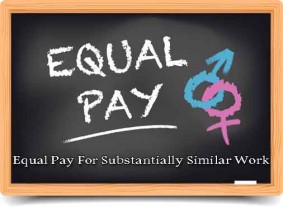 The concept of paying men and women equal pay for equal work should be familiar to California employers but under new legislation, wage equality requirements no longer apply only to employees with identical job descriptions. Employers are now required to pay male and female employees equal wages for doing “substantially similar” work.
The concept of paying men and women equal pay for equal work should be familiar to California employers but under new legislation, wage equality requirements no longer apply only to employees with identical job descriptions. Employers are now required to pay male and female employees equal wages for doing “substantially similar” work.
The legislation in question, California Senate Bill 358, was signed into law on October 6, 2015 by Governor Jerry Brown at the Rosie the Riveter National Historical Park in Richmond. The new legislation amends Section 1197.5 of the California Labor Code.
What Does the equal pay Bill Say?
SB 358 states that an employer may not pay any of its employees at lower wage rates than employees of the opposite sex for work that is substantially similar, when viewed “as a composite of skill, effort, and responsibility and performed under similar working conditions,” unless the employer can demonstrate that:
- The wage differential is based upon one or more of the following factors: a seniority system, a merit system, a system that measures earnings by quantity or quality of production, and/or a bona fide factor other than sex (such as education, training or experience.)
- Each factor is relied upon reasonably, and
- The factor or factors relied upon account for the entire wage differential.
The legislation clarifies that if an employer cites a “bona fide factor other than sex,” it must not be based on, or derived from, a sex-based differential in compensation. In addition, the factor must be related to the job in question, and it must be consistent with a business necessity.
Other aspects of the legislation include:
- The Division of Labor Standards Enforcement, which is in charge of administering and enforcing the legislation, may supervise the wages that are due to employees when a violation takes place.
- Employers must maintain records of the wages and wage rates, job classifications, and other terms of employment of their employees. The records must be maintained for at least three years.
- When an employee files a complaint with the Division of Labor Standards Enforcement, the name of the employee will be kept confidential until the Division establishes the validity of the complaint. (There is an exception to this, however, if abridging the employee’s confidentiality prevents the Division from investigating the complaint.) If the employee withdraws the complaint before his or her confidentiality is abridged, then the Division will maintain the employee’s confidentiality.
Your Equal Pay Responsibilities Under the New Law
If you run a business in Sonoma County, Mendocino County or Lake County California, and you have not monitored whether there is a gender gap in your employee’s wages, it is time to start. Consulting an attorney to ensure your wages meet the standards of this legislation may be far less expensive than dealing with a gender discrimination lawsuit.
If you are an employee of a California business in Sonoma County, Mendocino County, or Lake County and you suspect that wage discrimination is occurring at your workplace, you may want to speak with a labor and employment attorney. You can call or email our Beck Law P.C. labor and employment law office in Santa Rosa for more information.
